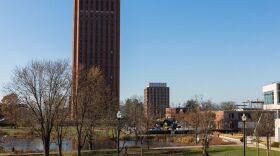The federal government’s COVID-19 chief for New England said he could not explain the missing shipments of ventilators and medical masks Massachusetts has experienced, and cited a scarcity of supplies “that we’ve never faced before.”
In a WBUR interview, Capt. W. Russell Webster, the federal coordinating officer for the Federal Emergency Management Agency’s regional office in Boston confirmed that 200 more ventilators are “en route” within the next 48 hours to the state from the national stockpile, for a total of 400 shipped to the state in the last week.
But that’s still well below the 1,700 Gov. Charlie Baker had requested — and the 1,000 he had expected to arrive a week ago.
“I don’t know where the number a thousand came from,” Webster said. “I will tell you that ventilators, among other medical supplies, are scarce regardless of where you are.”
This apparent miscommunication is just one example of the gaps nationwide in what states are seeking from the federal government, and what they are receiving amid the surge of people infected and hospitalized with the deadly coronavirus.
While some medical professionals recently have raised flags that ventilators may not always be the best treatment for COVID-19 patients, hospital executives nonetheless are looking to ensure they have an ample supply of the machines, should they need them.
“We work around the clock, 24 hours a day, seven days a week, to try and acquire additional ventilator resources,” said Rich Copp, a spokesman for Partners HealthCare, which operates Massachusetts General Hospital and Brigham and Women’s Hospital, among others. “We continue to hope that this region receives more from the federal or state government.”
Webster said FEMA is determining the need for ventilators in each state based on when the need is “critical within three days.” FEMA requires states answer a series of questions when applying for ventilators, to show lives will be in danger within 72 hours. As of Saturday, FEMA had 8,600 ventilators available for the entire country, according to a spokesperson.
As for masks and other protective gear, Webster said there are currently 75,000 of the N95 respirator masks — the ones so critical to front-line healthcare workers — on their way to Massachusetts. That’s a tiny number, according to hospital executives looking to stock millions of them. Webster said there are 145,000 masks on their way to both Maine and New Hampshire. Batches of surgical masks, which are less protective, also are being delivered to the New England states, he said.
Webster said he had no information about what happened to 3 million N95 masks Massachusetts had ordered through BJ’s Wholesale Club last month, which Baker said was impounded at the Port Authority of New York and New Jersey.
That ordeal led Baker to hatch a plan with the New England Patriots and their owners, the Krafts, to use the team’s jet to pick up 1.2 million masks in China and fly them to Boston on April 2.
A FEMA spokesman, Manuel Broussard, in a statement said, “FEMA is not seizing or hoarding medical supplies in the United States. We’re working with U.S. Customs and Border Protection to prevent fraud and ensure critical commodities and equipment do not leave the country and are distributed to areas with the greatest need.”
Amid the pandemic there have been reports of soaring costs for masks, and Massachusetts Attorney General Maura Healey announced Thursday her office is investigating price gouging for protective equipment.
Webster said he could not explain the high prices being charged and suggested any price gouging should be reported.
“I am not personally surprised that there are people who are illegally attempting to take advantage of this circumstance,” he said.
In a press conference Saturday at a Somerville facility where 80,000 masks a day will be sterilized, Baker said the state would continue to press for more new gear.
“We’ve found creative ways to track down more and more [personal protective equipment] and we’ll continue doing so in order to get more to the people that are battling this disease head on,” he said. The state is pursuing a total of 4,000 additional ventilators, he said, some of those from the private sector.
In a somber moment the day before Easter, Baker also said, “If in this holy week people need to pray, I would urge them to pray for a lot of the folks who are going to be taking care of those who get sick, praying for those who do get sick and praying for their families.” Baker added, “This is going to be a rough time.”
Webster, who served for 26 years in the U.S. Coast Guard, was the regional FEMA chief during the Boston Marathon bombings. He’s now overseeing a team of 196 in the COVID-19 emergency. He said he is in daily touch with the governor and will continue to bring more resources to Boston to care for those affected by the outbreak.
For instance, early this coming week, he said two Army Reserve Urban Area Medical Task Force teams — of 85 people each — will be dispatched to the Boston Convention and Exhibition Center, which is serving as a field hospital.
Compared to past emergencies he has dealt with, Webster said, “I would tell you that this is an unprecedented crisis that is much more than a pandemic. I’ve already released over $100 million in assistance to our six states” and 10 Native American tribes. “But this is a 50-state, slow-moving tsunami of destruction of a deadly virus.”
Correction: An earlier version of this story misstated the amount of relief already released during the pandemic. It is over $100 million.
This article was originally published on WBUR.org.
Copyright 2020 WBUR





